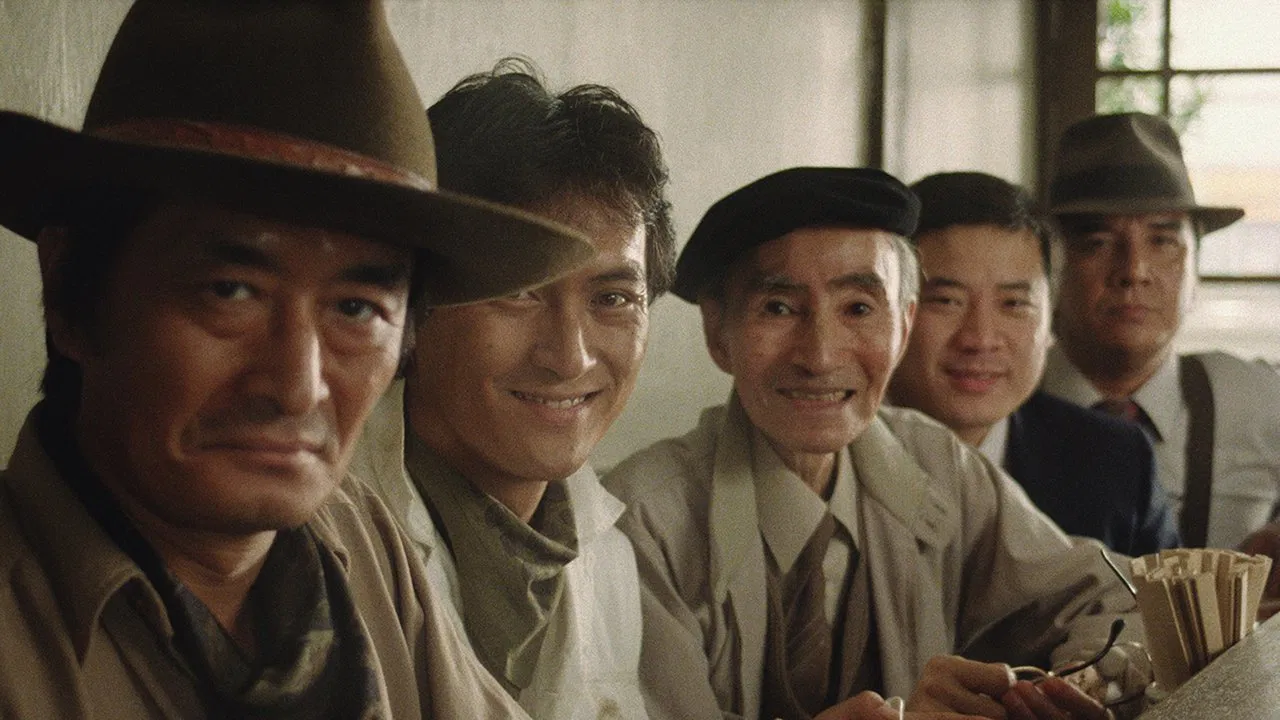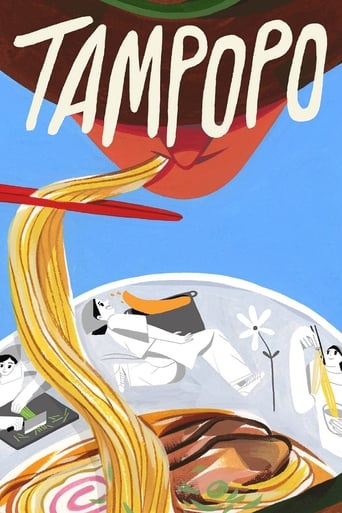Comwayon
A Disappointing Continuation
SteinMo
What a freaking movie. So many twists and turns. Absolutely intense from start to finish.
Brennan Camacho
Mostly, the movie is committed to the value of a good time.
Jackson Booth-Millard
I found this Japanese film in the 1001 Movies You Must See Before You Die, I jokingly thought the title (translated "dandelion") was something to do with a feminine hygiene product, it was rated very well by critics, so I hoped it would be worthwhile. Basically a pair of truck drivers, the experienced Goro (Tsutomu Yamazaki) and his younger sidekick named Gun (Ken Watanabe), stop at a decrepit roadside ramen noodle shop named "Lai Lai", owned by widowed Tampopo (Nobuko Miyamoto). The two truckers return, Tampopo asks their opinion of the noodles, Goro and Gun tell her they are "sincere, but lack character". Goro gives her advice, and she asks him to become her teacher, they turn the establishment into a place that will have the "art of noodle soup making". Goro takes her around and points out the strengths and weaknesses of her competitors, but Tampopo cannot get the broth just right, so a Noodle-Making Master is brought in for his superlative expertise. After saving the life of a wealthy old man (Hideji Otaki), from choking on his food, he lends her his chauffeur Shohei (Kinzo Sakura), who has a masterful way with noodles. Through trickery, they are also able to pry ramen secrets from their competitors, the group also change the name of the restaurant to "Tampopo". Goro previously had a fight with a customer called Pisuken (Rikiya Yasuoka), they have a rematch, ending in a draw, Pisuken reveals he is a contractor, he offers to makeover the shop's interior. Tampopo's latest effort still comes up short, so Pisuken teaches her his own secret recipe, this proves to be successful, soon customers are filling the newly redecorated shop. There are other subplots going on at the same time, including culinary knowledge in a French gourmet restaurant; a women's etiquette class on how to eat spaghetti properly; and a man in a white suit (Koji Yakusho), an elegant gangster, and his lover (Fukumi Kuroda), exploring erotic ways to use food, in the end he is shot dead, his last words to his lover are about a secret recipe for sausages. You could argue that this movie is much more about the food, the performances are all fine and it is nice simple story about transforming a failing noodle business into a successful venture, along with little spoofs of westerns and stereotypical American movie themes, characters and other stuff, but the most memorable sequences involve the preparation or eating of noodles and various other Asian and continental dishes, almost food porn, so feast your eyes on this enjoyable comedy. Very good!
JLRVancouver
Fun Japanese comedy about that most sensual of activities: eating. A heroic stranger intervenes to save a widow's ramen shop, so there are no shortage of comparisons between this 'noodle eastern' and 'spaghetti westerns'. Interludes about food and culture are interwoven between segments of the main story, including scenes of some highly erotic fork-play. The film is in Japanese of course but the dubbed version that I watched while on an airplane was well enough done. The film will make you hungry, so be prepared (although I was not sufficiently inspired to order pot-noodle from the in-flight catering) – this would be a great movie to watch with friends while slurping noodles and drinking sake.
jeff light
This is quite literally food pornography in many scenes. You can accurately judge the whole film by the credits scene, which is a 2 minute close up of a woman's nipple as she feeds her baby.The film documents the rather Japanese obsession with food and the "correct" way to eat, prepare, or order it. You can tie it into sexual repression and the replacement of enjoying food instead of enjoying sex. (There is no kissing or sex between any of the characters in the two main love stories, unless food is in their mouths.)The main story of a woman seeking to become the best noodle chef is supplemented by several short scenes of random strangers that are loosely based on the food theme as well, but otherwise have nothing to do with the main narrative. A lot of people would probably like this film a lot more if those unrelated scenes were cut out, leaving the main narrative at about 1 1/2 hours. As is, they are often very seriously filmed while meant to be darkly, bizarrely comical. I don't think many people will find them funny, and some scenes actually reinforce a lot of negative ideals in Japan. For example, a couples' food fetishism beginning when a gangster buys an oyster from a child diver (she might be 12 or so) and eats it from her hand, whereby they start making out. A husband attempts to keep his wife alive a few minutes longer by demanding she make the family dinner before dying. An old lady with dementia damages all the food in a grocery store while "inspecting" it, and the store owner chases her around the store.These highlight very real issues in Japan. Ignored mental illness in the elderly. Rigid gender roles and unhappy marriages. The worship and fetishization of young girls by men old enough to be their fathers. Far from being a document of these issues, the film does not seem to censure them in anyway, and actually to support them a bit. Take them out and you're still left with a main story that has hollow comedy, is mired in boring details, and has an irresolute love story. And it's all built around the idea that a woman needs a team of men to teach her how to be a good noodle cook, despite one's comment that "I never believed a woman could be as good of a noodle chef as a man!"Frankly, it's a movie that is cleverly directed, but whose story and tone were archaic at the time, and are even more disgusting by modern standards. Look elsewhere for depth or entertainment.
thismango
When so many films both in Asia and the West are either cynically grim or tediously self-indulgent, it is a delight to experience the masterful work of a director who views humanity with warmth and sympathy but without illusion, who can be amusing without being silly, profound without being pompous, and serious without being depressing.Tampopo is completely unique and defies definition in terms of genre and subject matter. It is moving, amusing and sad. Beyond its emotional content it has a philosophical depth which is not conceptually elaborated but which permeates it like the subtle flavour of a perfect noodle stock.The main characters are all fairly thoroughly rounded and battered by the abrasions of life. Without hiding their sadness, we see their joy in appreciating small achievements and subtle pleasures. There is a simple storyline but it's not the main point of the film. The real content is in the development of the characters and their interactions, and the subtly exaggerated comedy of the world view expressed in the film. There are numerous side-plots which range from extreme violence to hilarious eccentricity - a gangster is horribly murdered in front of his girlfriend; an elderly woman infuriates a shopkeeper by sneaking around the shop squeezing items of food.Tampopo is an absolute joy and offers a refreshingly original viewpoint on the possibilities of film making. And it will make you hungry.

